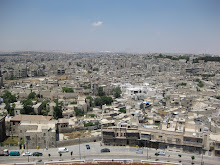初めて「ディワニーヤ」に参加した。ディワニーヤとは、以上の記事のようなもので、日本語で無理矢理言えば、「地区の集会所」とか「井戸端会議」とか「おしゃべり」とか「レクリエーション」とか、そういった言葉を連ねればどうにかなるかといえば、説明にはまるでならない気がする。アラビア語はフスハーとアンミーヤというほとんどまるで違う2つの「言語」に分かれていて、私たち学習者は大抵前者を、「普通の」アラブ人が「普通の」会話で使用するのが後者で、後者は文字で音を表すことができるが、フスハーの音が変化したものであるから、辞書には載っていない。そのため、この「ディワニーヤ」という概念も、当然辞書にも載っておらず、当初期待していつも通り考えうるスペリングで次々と引いても出てこずうんざりしてきた矢先にクウェート方言(アンミーヤ)であり、なによりもクウェート伝統のクウェート文化なのだということに行き着いた。(この記事の後に続く)
(http://www.kuwaittimes.net/read_news.php?newsid=MTE3ODk1NTA3Ng==)
The seasonal Diwaniya
Published Date: June 27, 2008 By Hussain Al-Qatari
This is what you will see: empty and half-empty bags of junk food, cigarette butts, ashtrays, empty cans of soft drinks (occasionally used as ashtrays). Socks - smelly, balled up and thrown to the side of the room, their reek mixing with the air already thick with smoke, with a trace of perfume or aftershave. This, unmistakably, is the room where young men spend a lot of their time in the summer, escaping the heat and trying to defeat the boredom. These are 'Diwaniyas', but of a different kind.
Diwaniyas figure as a main pillar in Kuwaiti life. Their existence distinguishes Kuwait from any other country in the Gulf region. They take the role of political forums set by the people of the country to discuss their concerns, and throughout the history of Kuwait they have proven their influence more than once.
While they reach their highest climax during political crisis, a sub-category flourishes during the season of summer, when Kuwaitis flock to their favorite summertime destinations, and expatriates go back to their homelands, and the once-packed streets become gradually empty. The search for entertainment occupies every Kuwaiti youth then.
For a good majority, the answer to this quest is found in Diwaniyas. The Diwaniyas fo the youth are not actual Diwaniyas - they are rather quasi-Diwaniyas. Despite the fact that they are crowned with the title 'Diwaniya', they differ hugely. The only similarity that they share with actual Diwaniyas is that they are strictly for males. These Diwaniya replicas are usually the hangout of young men in their late teens and early to mid twenties -- although some of them might include some 'seniors'.
This kind of Diwaniya is more than a hangout place, though. It is a phase that every young man goes through as he grows up. It is the attempt of youngsters to imitate the community of the elders, but the young version is vibrant with its own features. Generally, it is more laidback and relaxed, and is free from the stress of politics, although the subject may arise occasionally.
What you can do
The things that one does inside a Diwaniya are unlimited, but there are a few things that are essential. They include: two decks at least of cards, a video game console, a DVD player, a subscription to the exclusive broadcasters of any current soccer tournaments. Soccer is usually a huge attraction in Diwaniyas, with plasma screens that give a similar feeling of a soccer field. Aside from pure entertainment, you can boast about your latest escapades and share the latest dirties secrets - not of yourself, but of others (we don't like to call it gossip - it usually comes out dressed as a series of complaints and announcements of new discoveries). You can also be there just for the Internet access, or to get help from The Nerd with your homework, if you have any.
When you can go
Generally speaking, you do not ask 'when' when you want to go to a Diwaniya. You just go. The doors of a Diwaniya are usually open all day long, all week long, all month long -- and all year long. Do not make yourself a stranger. If you have been invited there once, then you have unlimited access to the place-and to everything inside the place. You can raid the mini-fridge, watch anything from the large variety of DVDs, choose among numerous video games and do whatever makes you happy. Once inside the Diwaniya, you do not have to leave unless you want to. There's no such thing as 'time to go'. All necessary facilities are available: wireless Internet connection, telephone, bathroom, you name it. Spare blankets and pillows are usually available on demand, unless you carry your own sleep bag in your car.
What you can talk about
Talking depends on the different kinds of people in the Diwaniya. Diwaniyas usually have a diversity of people and opinions, each an expert in their own field. That in turn allows for many subject s to be tackled. Generally, it all depends on when you talk about whatever you want to talk about, and with whom you open the subject. If you speak to The Philandering Womanizer about his views on the current political state, you have committed a grave mistake. You are bound to expect a very graphic answer that may or may not have anything to do with your question. If you speak to The Geek, expect an answer in tech gibberish. Coarse language is almost mandatory. You will hear a lot of creative combinations of curse words in different situations. The key point is to try to be present with an open mind.
Strangers' treatment
New faces appear regularly, but only a few of them leave the status of 'new' and become 'regular', forming therefore a strongly-bound small community of Diwaniya members. If you happen to be the new face, then prepare to be probed. Older Diwaniya members will find it necessary to test you and determine what kind of person you are. The criteria that decides the result differ depending on those who are quizzing you. To some, it is your ability to formulate funny punch lines and your idea of what actually is a funny line. To others, it's the amount of resilience you show towards the jokes that are directed to you. Your job and educational level rarely matters, and while there, do not expect people to have great interest in what you do for a living, your dissertation subject, your idea of a great epic work of literature or your acquaintance with symptoms of psychological disorders. It's not an ivory tower; it's a Diwaniya. Being there should not require much mental effort. You are there to enjoy your stress-free time.
どんなところにも人が住んで生きる場所には「文化」というものが存在すると信じたいところだが、この国にはどうもそういうものが希薄なのではないかと思わせる「材料」のほうが、そうでないものよりも用意がされやすい。「これが私たちの『文化』です、ハイ」と言って提示できるものが果たして「文化」がどうか分からないが、もしそういうことにするとしたら、このディワニーヤがその中の貴重なひとつに間違いなく数えられる。
今回お邪魔したディワニーヤの主たちはそれぞれ10年近く仏や英に留学し、帰国後は検察官や弁護士、裁判官や省庁の役人として働く50代の、典型的アッパーミドルのクウェート人男性。賢い方だとは思うが、特段驚愕するほど教養・知識人かと言うと、もちろんそうではない。ただ、とりあえず時間の無駄ではなかったかなと思わせるには十分というところ。ああ、こう書くと、私は常に他人を見下しているような印象を与えるのかも知れないが、断じて。比較の問題。決して自分が云々とは一言も言っていない。
なぜか今日は(は、と言っていいのかどうか知らんが)説明が冗長なので明瞭簡潔に努めよう。この習慣、文化を私は心から羨ましいと。アラブ文化の豊かさというのは人々の関係性だと思う。私的に所有された家屋やその他茶菓子等が社会の公の役割を、基盤から、ベースからがっちりと支えて。日々交わされる、急げば無駄とすら思えてしまうほどの長く「執拗な」挨拶文句は「過剰な」までの存在肯定と、コミュニケーションにとどまらない「議論」が公共的空間(この国にいて、ヨーロッパやアフリカとの文化的歴史的学術的接点を多く見つけることは容易だけれども、逆に言えば、この辺りが特に、例えば日本との絶望的な差異となって私の頭を打つ。)を下支えすることに、アラブ・イスラム文化に惚れるとしたら、私はこれを、心底愛しいと思う。イスラーム圏を「客人」として放浪する醍醐味はまさにここにあって、普段、とても客観的論理的に理解できないと吐いていても、究極的には、彼らの温かさ、「人間らしさ」が、どうしようもなく愛しくさせるのだと思う。
これはアラブ・イスラムに限らないが、極東アジア圏は比較的「氏名」が世界的に短いほうで、大部分は、父方母方含めて先祖代々入り組んだ名前を一人ひとりが持っている。文通していたブラジルの子の名前が途方もなく長くて、その一つ一つの要素にとてつもない歴史が垣間見えて、(例えば、これは多分ユダヤ人でオランダからブラジルに何十年か何百年前に移住してきたのだろうとか、これは何語から来ているとか、というセグメントが6、7個列をなしているような)どうしようもなく、その「重さ」にやられそうになったことがあったけれど、アラブ・イスラムも例外でなく、父親の名前が入ったりしてややこしく出来ている。先日イランのビザを無事取得して、あとは胸躍らせて旅行を待つだけなのだが、そのビザの氏名には父親の名前も途中に入って、「誰か、歴史、先祖と繋がっている感」満々の名前に仕上がっている。
この「繋がっている感」満々の名前を持ち、感情表現を表に良くも悪くも出し、豊富な挨拶表現と、密着した人間関係と、本当に誰でも受容される公共空間が常に確保されているということ(時間も場所も。そういう時間がたんまりあるというのは何もオイル収入が豊富なクウェートに限った話ではないが。私の実際的知識はクウェートとシリアしかないが、どちらも14時には仕事は終わり。いかに裁判官であろうとも、おそらく。)、そして、「強烈な」イスラームが付いていれば、誰も自殺することはないだろうし、少なくとも「ポジティヴ」に生きていけるのではないかと思ってしまう。ネガティヴラーの私には、どうも酷な感じだが。
そういうわけで、疲れ切って冷え切った日本やとりわけ東京なんかを思い出せば、粘着性のある砂漠の民の部族関係や、激しい昼夜の気温差や気候変動が下地となる彼らの気質に、まあ、色々と思うところはあるわけで。ただ、ため息ひとつでも。
Thursday, January 15, 2009
Subscribe to:
Post Comments (Atom)

No comments:
Post a Comment